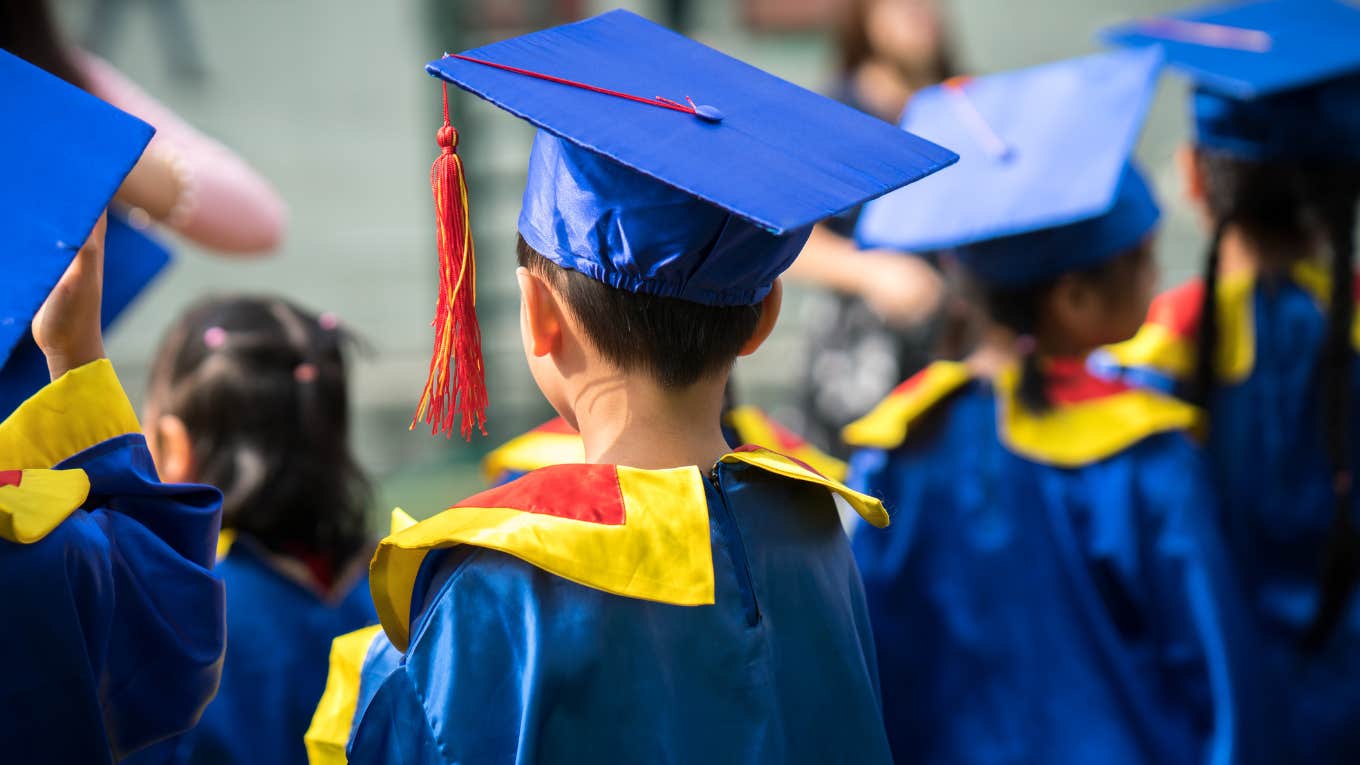Teacher Says People Should Save Graduations For When Kids ‘Actually Achieve Something’ — ‘We Don’t Need A Kindergarten Graduation’
Who decides what is and is not an achievement?
 Vietnam Stock Images / Shutterstock.com
Vietnam Stock Images / Shutterstock.com In a Reddit post a teacher shared her “hot take” on student graduations — angering tons of readers in the comments.
“Maybe this is a bad take,” she wrote, “but I think this whole thing is getting ridiculous.” What’s she so upset about? Kindergarten graduations, middle school moving-up ceremonies, and parties for students entering a new chapter of their educational lives.
The teacher argued that graduations should be saved for high school and higher education students — ‘It should be saved for people accomplishing something.’
“When I was in school (not really that long ago), we just had high school graduation; it was for students who actually graduated,” the teacher wrote. “Now it seems like there is a ‘graduation’ for everything … kindergarten, 6th grade, 8th grade …and so on.”
This teacher suggested the graduations for young students and celebrations for moving through school were both premature and ridiculous.
“I guess I just feel like these events should be saved for when the students have truly accomplished something,” she wrote, “because until high school graduation everyone gets to move on, even if they haven’t earned it.”
Many schools have kindergarten ‘graduations’ or even middle school celebrations at the end of the year, but this teacher thinks they’re ‘ridiculous.’
As many commenters shared, kindergarten graduations and other younger student celebrations might not mark a transition into adulthood, but that doesn’t make them any less important. In fact, kindergarten is one of the most fundamental and influential times in a student’s life, setting them up for success down the road.
Shouldn’t that be celebrated in the same way as a high school graduation?
So, whether the graduations celebrate students’ achievements, support parents, or even create a safe space for families to enjoy a happy event together, shouldn’t they be classified as an “achievement?”
 Tharnapoom Voranavin / Shutterstock.com
Tharnapoom Voranavin / Shutterstock.com
Regardless of their celebratory nature, she was steadfast in her belief that they were just not necessary. “I even saw a post from a friend about their child at a ‘signing’ party to start kindergarten,” she wrote. “High school and higher education should be the time for these celebrations.”
Despite this teacher’s opinion, many commenters said ‘celebration’ is essential to kids’ confidence, happiness, and overall growth at school.
Commenters passionately disagreed with the teacher’s standards of “achievement,” especially parents who’ve raised children through difficult schooling situations, learning disabilities, or even school-focused anxiety. They understood just how important it was to show up and celebrate these occasions.
In fact, celebrations and the acknowledgment of a student’s hard work at transitional times are essential to their growth — academically, emotionally, socially, and mentally. It not only helps them build relationships with professionals at their schools, but it builds their confidence in the classroom, with peers, and navigating each educational transition — whether it’s kindergarten, middle school, or adulthood.
“Many of my students attend the same school for Pre-K through 8th grade, so I think that’s definitely worthy of a proper send-off before going to high school,” one person added in the comments. We call it a ‘promotion ceremony’ instead of graduation. At the end of the day, it’s a chance to celebrate the milestone and the kids’ achievements.”
“Kindergarten was also not easy for my son at all. We discovered this year that he's on the autism spectrum and has ADHD. He has struggled a LOT yet done amazingly well! Imagine going through every single day, and the world feels like an assault on your sensory and nervous system,” another parent passionately wrote. “I will continue to celebrate this kid every single day. He is amazing.”
Zayda Slabbekoorn is a News & Entertainment Writer at YourTango who focuses on health & wellness, social policy, and human interest stories.

